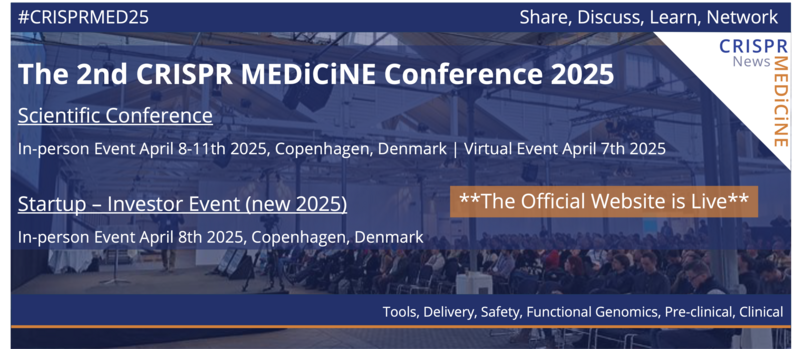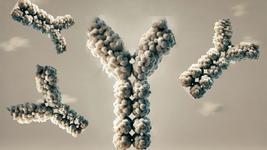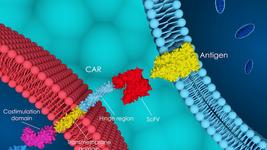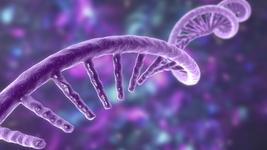CMN Weekly (8 September 2023) - Your Weekly CRISPR Medicine News
By: Karen O'Hanlon Cohrt - Sep. 8, 2023
Top picks
- In an article published yesterday in Nature Biotechnology, a team of researchers based at San Raffaele Telethon Institute for Gene Therapy and Vita-Salute San Raffaele University (both in Italy), share their findings on an extensive and thorough comparison of state-of-the-art base and prime editors versus Cas9 editing in human haematopoietic stem and progenitor cells. Following a comparison of many parameters including editing efficiency, cytotoxicity, transcriptomic changes and on-target and genome-wide genotoxicity, they uncovered advantages but also limitations of the emerging base- and prime editor-based gene-editing systems.
- Epigenome Editing Companies Mark Preclinical Progress. This piece in Genetic Engineering & Biotechnology News summarises pre-clinical-stage programmes undertaken by six companies working to advance epigenome-editing therapies.
Research
- In an article published today in Nucleic Acids Research, researchers in Denmark report a novel delivery strategy based on lentivirus-derived nanoparticles (LVNPs) to facilitate RNP administration of SpCas9 as well as SpCas9-derived base and prime editors (BE/PE) to cells. They found that unique Gag/GagPol protein fusion strategies facilitated RNP packaging in LVNPs, and refinement of LVNP stoichiometry supports optimised LVNP yield and incorporation of therapeutic payload. They demonstrate near instantaneous target DNA cleavage and complete RNP turnover within 4 days.
- Scientists in China report performance evaluation of a CRISPR-Cas9-based selective exponential amplification assay for the detection of KRAS mutations in plasma of patients with advanced pancreatic cancer. The assay uses CRISPR-Cas9 to continuously shear wild-type alleles during recombinase polymerase amplification, while mutant alleles are exponentially amplified to eventually reach a level that is detectable by Sanger sequencing. When applied to detect KRAS mutations in plasma circulating tumour (ct)DNA isolated from 153 patients with stage IV cancer, the team observed 91.43% vs. 44.83% detection rates in patients pre-chemotherapy vs. those undergoing chemotherapy. KRAS ctDNA was more prevalent in patients with liver metastases and patients who did not undergo surgical tumour resection. The findings were published yesterday in Journal of Clinical Pathology.
- To improve the efficiency of gene editing in human-induced pluripotent stem cells (iPSC), scientists in the United States have developed a strategy based on the application of trichostatin A (TSA), a small-molecule inhibitor of Class I and II histone deacetylases. They observed that TSA decreased global chromatin condensation and led to increased gene-editing efficiency of iPSCs by two- to four-fold without an increase in off-target effects. The edited iPSCs could be clonally expanded while maintaining genomic integrity and pluripotency. Their findings were published yesterday in CRISPR Journal.
- In an article published yesterday in Cancer Science, a team in Japan report the generation of T cell receptor gene-modified allogeneic T cells in which the endogenous T cell receptor is silenced using siRNA. A lentivirus-based CRISPR-Cas9 system targeting β-2 microglobulin (which is associated with graft-vs-host disease) in TCR gene-modified T cells was used to silence HLA class I expression and prevent allogeneic CD8+ T cell stimulation without disrupting the cells' anti-tumour capacity. The authors claim that this is first demonstration that siTCR technology is effective in preventing graft-vs-host disease, and that adoptive cell therapy with allogeneic T cells engineered with siTCR vector may be useful in developing an "off-the-shelf" therapy for cancer patients.
- Scientists in the United States report the development and implementation of APOBEC Reporter Systems for Evaluating diNucleotide Editing Levels (ARSENEL) in living cells. The ARSENEL panel comprises four constructs that quantitatively report editing of each of the four dinucleotide motifs (AC/CC/GC/TC) through real-time accumulation of eGFP fluorescence. Editing rates of APOBEC3Bctd and AIDΔC CBEs reflect established mechanistic preferences with intrinsic biases to TC and GC, respectively. The team tested twelve different base editors using this system with a full-length APOBEC3B CBE showing the greatest on-target TC specificity and an APOBEC3A construct showing the highest editing efficiency. The full study findings were published in CRISPR Journal yesterday.
- In an article published this week in Nature Communications, scientists at multiple institutes in the United States share findings demonstrating that multiple orthologs of Cas12a activate trans-cleavage in the presence of split activators. They show that the PAM-distal region of the crRNA recognises RNA targets provided that the PAM-proximal seed region has a DNA target. Their method, which they call Split Activator for Highly Accessible RNA Analysis (SAHARA), was capable of detecting picomolar concentrations of RNA without sample amplification, reverse-transcription, or strand-displacement by simply supplying a short DNA sequence complementary to the seed region. They also found that SAHARA outperforms wild-type CRISPR-Cas12a in specificity towards point mutations, and that it could detect multiple RNA and DNA targets in pooled crRNA/Cas12a arrays via distinct PAM-proximal seed DNAs.
Industry
- Beam Therapeutics presented new pre-clinical data this week, demonstrating the ability of its in vivo base-editing therapeutic candidate, BEAM-302, to directly correct the PiZ mutation, the primary disease-causing mutation associated with severe alpha-1 antitrypsin deficiency (AATD). The data were shared in an oral presentation titled “BEAM-302: Targeting AATD Liver and Lung Disease with Base Editing” at the Alpha-1 Antitrypsin Deficiency 2023 Meeting in Naples, Italy.
- Beam Therapeutics also reported dosing of the first patient with BEAM-201 this week. BEAM-201 is a multiplex-edited allogeneic CAR-T cell candidate developed to treat relapsed or refractory T-cell acute lymphoblastic leukaemia/T-cell lymphoblastic lymphoma. BEAM-201 is being evaluated in a Phase 1/2 clinical trial. You can read more about this news in our recent clinical trial update.
- Wave Life Sciences announced this week that it has submitted the first clinical trial application for WVE-006, the first-ever RNA-editing programme to enter clinical development. WVE-006 is designed to restore production and circulation of functional, wild-type alpha-1 antitrypsin (AAT) protein and reduce levels of mutant Z-AAT protein, thereby addressing alpha-1 antitrypsin deficiency-related lung disease, liver disease or both. Specifically, WVE-006 is a GalNAc-conjugated RNA-editing oligonucleotide designed to correct the single-base mutation in mRNA coded by the SERPINA1 Z allele, thereby enabling restoration and circulation of functional, wild-type alpha-1 antitrypsin (M-AAT) protein.
Reviews
- CRISPR applications in cancer diagnosis and treatment. In this review article, scientists in China provide an overview of the functional characteristics of Cas9, Cas12, and Cas13. They also highlight the latest advances and applications of CRISPR systems in cancer gene therapy and molecular diagnosis. By aiming to provide a comprehensive overview of the current state of CRISPR technology in cancer research, the authors hope to inspire further exploration and innovation in this rapidly evolving field.
- Evolving Therapeutic Options for the Treatment of Duchenne Muscular Dystrophy. The authors of this review, based at Ohio State University, highlight the most up-to-date therapeutic progresses in the Duchenne muscular dystrophy (DMD) field, with emphasis on past and recent experiences, as well as the latest clinical results of DMD micro-dystrophin gene therapy. They also discuss lessons learned along the way and challenges encountered, all of which have helped advance the field, with the potential to finally alleviate such a devastating disease.
Awards
- Associate Professor (tenured) and Group Leader, at the Department of Biomedicine, Aarhus University, Denmark, Rasmus O. Bak has been awarded this year's Jens Christian Skou Award. This annual award is given to one recipient in recognition of his/her outstanding research, talent, and extraordinary creativity and productivity, and is awarded in honour of Danish biochemist and Nobel laureate, who received the Nobel Prize in Chemistry in 1997 for the discovery of the sodium-potassium pump. We congratulate Rasmus O. Bak and look forward to hearing his present his work at the upcoming CRISPR Medicine Conference in April 2024. More details about the conference here.
News from CRISPR Medicine News
- This week, we published a clinical trial update about BEAM-201, a multiplex-edited allogeneic CAR-T cell candidate developed by Beam Therapeutics to treat relapsed or refractory T-cell acute lymphoblastic leukaemia/T-cell lymphoblastic lymphoma. BEAM-201 is being evaluated in a Phase 1/2 clinical trial, and the company announced this week that the first patient has been dosed. Read the update here.
- We also hosted a CMN Webinar with guest speaker Andrew Bellinger, M.D., Ph.D, CSO and CMO of Verve Therapeutics. His presentation, entitled: 'Disrupting the Care of Cardiovascular Disease With Single-Course Gene Editing Medicines' illustrated the huge global burden of cardiovascular disease, the limitations of the current chronic care model, and presented the novel base-editing therapies that Verve is advancing to cure cardiovascular disease. Watch the on-demand recording here.
To get more of the CRISPR Medicine News delivered to your inbox, sign up to the free weekly CMN Newsletter here.
Tags
CLINICAL TRIALS
IND Enabling
Phase I
Phase II
Phase III
IND Enabling
Phase I
Phase II
Phase III
Amyotrophic Lateral Sclerosis, ALS, or Frontotemporal Dementia FTD, (NCT04931862)
Sponsors:
Wave Life Sciences Ltd.
Sponsors:
Wave Life Sciences Ltd.
IND Enabling
Phase I
Phase II
Phase III







